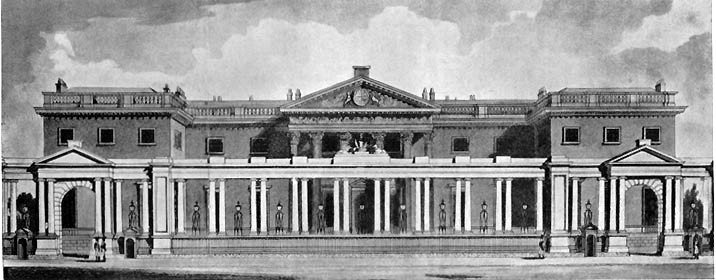
by Ralph Berry
“We write ‘the British’ when we mean ‘the few members of the Foreign Office who happened to concern themselves with this question…In the end we build up a picture of an apostolic succession, in which statesmen moving from one muddle to the next display ‘the continuity of British foreign policy’.” (A.J. P. Taylor, THE TROUBLE MAKERS, pp. 11-12) Taylor’s scorn for the Foreign Office was matched by Margaret Thatcher, who loathed it. And yet the Foreign Office emerged unscathed from every fresh embarrassment which it has signed off for the Government to handle. The F.O. sails serenely on, as it always does.
I’ll try to account for this absurd but rock-bound situation. Here are some suggestions. The first is the historic prestige of the F.O., dating from the age in which no great issue could be settled without Britain. That era ended with Neville Chamberlain. The second is the magnificence of the buildings over which the F,O. holds sway.
Carlton House still has the massive desk where Palmerston worked, as does his latest successor. The current occupier of that position does not need a chauffeur for cabinet meetings. He/She simply walks across the road to Downing Street. Over weekends, the grace-and-favour residence of Chevening beckons. This is a 125-room house in Kent, set in 3,500 acres with a lake said to be designed by Capability Brown.
When Boris Johnson was Foreign Secretary he invited all equivalent members of the European Union for lunch there, with a trip on the lake an extra inducement. I don’t doubt that the Europeans were suitably impressed with this display of soft power.
To work, however. The present epicentre for the F.O. expertise is Ukraine. It is hard to see why this should be so. Britain has never regarded that country as a vital interest, not in the way that Poland dominated politics in the 1930s. But Poland-Ukraine is now an axis of power that draws into its orbit the greatest forces in European politics. All this started at the beginning of the crisis when Russia invaded Ukraine (‘illegally’, as the press primly but superfluously never fails to add). Boris Johnson at once declared for Ukraine by visiting Kiev a couple of times when no other leader would go near the place. He bounced Britain into making Ukraine a front-line British interest, besides installing himself as the heroic champion of a righteous cause. The role sat well with him, and it was soon cemented into State policy. Vlodymyr Zelensky was invited to address the Commons on ZOOM, and the US followed with an address to Congress.
Ukraine flags sprang up everywhere including Westminster. Many refugees were invited to British homes (a problem, for their six-month stay is now over and the many refugees have to compete with others; some 400 hotel spaces have already been allocated to the boat people migrants).
This tremendous national effort has not been subject to a debate in the Commons. It has simply been willed by the governing class and imposed upon a docile public, which is not used to making a decision anyway. No serious public effort has emerged to ask the questions:
‘What are we doing in Ukraine? Is the extent of our commitment wise?’
Johnson has gone very quiet and makes no more photocalls with Zelensky. The war he did so much to promote and the F.O. to institutionalize has now entered a disturbing new phase.
The winds blow from a different angle. Apart from the crude Russia-bashers, the tone of the war reportage has shifted. There is no more talk of ‘winning the war’, always a claim that stretched reason to its natural limits. Instead the Ukraine demands for more ammunition and weaponry, so that they can launch their talked-of offensive, fall upon unheeding ears. Russia is playing it long; they believe that long wins. A few days ago a Ukraine drone missile destroyed a Russian ammunition dump. The Russians did not retaliate with a civilian-target strike; they merely launched a series of rockets from the Arctic and Caspian Sea, which took out a chemical plant or ammunition dump. The point: anything you can do, we can do better. Still fancy your chances?
The implications for Government policy are deeply unhappy. If Ukraine cannot win its war, the war goes on. Its costs, human and financial mount with every passing day. Zelensky is an impassable obstacle to peace, and Russia cannot be defeated on the battlefield. Britain, with the full connivance of the Foreign Office, has completely loused up its central European policy. Again!
- Like
- Digg
- Tumblr
- VKontakte
- Buffer
- Love This
- Odnoklassniki
- Meneame
- Blogger
- Amazon
- Yahoo Mail
- Gmail
- AOL
- Newsvine
- HackerNews
- Evernote
- MySpace
- Mail.ru
- Viadeo
- Line
- Comments
- SMS
- Viber
- Telegram
- Subscribe
- Facebook Messenger
- Kakao
- LiveJournal
- Yammer
- Edgar
- Fintel
- Mix
- Instapaper
- Copy Link







